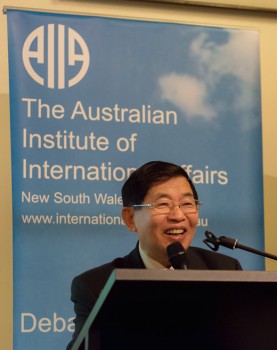Taiwan's First Female President
Recent speculation has focused on how Tsai Ing-wen, Taiwan’s first female president, will perform. Dr Parris Chang, president of Taiwan’s Institute for Political, Economic and Strategic Studies analysed the situation at Glover Cottages on Tuesday 5 April. He said that after centuries of colonial occupation by the Dutch, Spanish, British, Japanese and Manchus, the Taiwanese are masters of their own destiny. Furthermore, while male chauvinism remains strong in Taiwan, the commander of its armed forces now wears a skirt and 38% of Yuan members are women. Mao had said women hold up half the sky, but women are not really liberated in China. Taiwan is doing much better.
Since its formation in 1986, Tsai’s Democratic Progressive Party (DPP) has advocated independence from China. But since becoming president, Tsai has trodden softly. There will be ‘no surprises’. Beijing has so far responded calmly. Formally, it refuses to have anything to do with the DPP, but informal contacts under the table and in the business world are permitted. Nevertheless, 1600 ballistic missiles remain pointed at Taiwan, and China’s Anti-Succession Law continues to threaten force not only if Taiwan declares independence but if ‘possibilities for peaceful re-unification are completely exhausted’. Chang fears that China would continue to make life difficult for the Taiwanese by means of united front operations, and the Trojan horse of Chinese investments.
Chang observed that in the recent past it was fashionable for political leaders in Singapore and Malaysia to disparage democracy as having been imported from the West and praise instead ‘Asian values’. But the Taiwanese want their country to become democratic, a beacon of freedom in the region. A transition in political thinking is required, not only about freedom, but corruption. The KMT was habitually corrupt, but the DPP wants to emphasise the rule of law. A transition must also occur in the pattern of Taiwan’s economy and trade. Until now, Taiwan’s growth has depended on China’s economic health. Seventy percent of Taiwan’s GDP is from exports, and forty percent of those go to China. But the DPP aims to diversify trade, join the TPP and develop more hi-tech industries. Taiwan wants to be much more active economically in the region. It wants free trade agreements with its neighbours including Australia. It has a ‘go south’ economic strategy. Many Taiwanese business people are already in the region.
During question time, a member of the audience observed that it was all very well for Taiwan to want normal diplomatic and trading relations with the region, but an inhibiting factor would continue to be Chinese opprobrium. And it seemed this disapproval will only become stronger as China expands its regional influence. Chang agreed, but said that much could be achieved through the activities of NGOs. United States NGOs were particularly active in expanding trade and politicallinks with Taiwan.
Report prepared by Richard Broinowski
